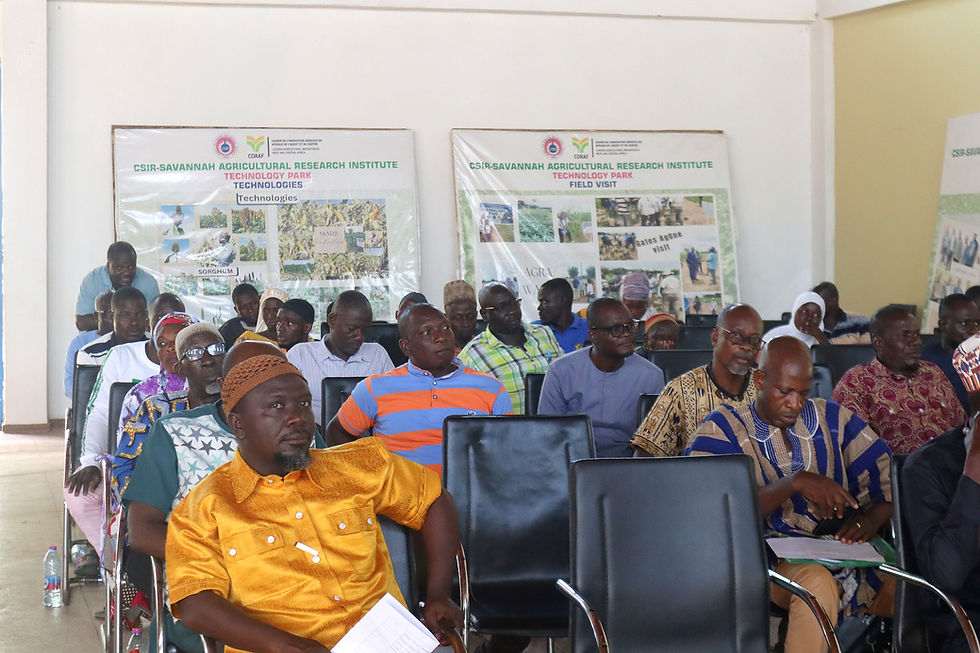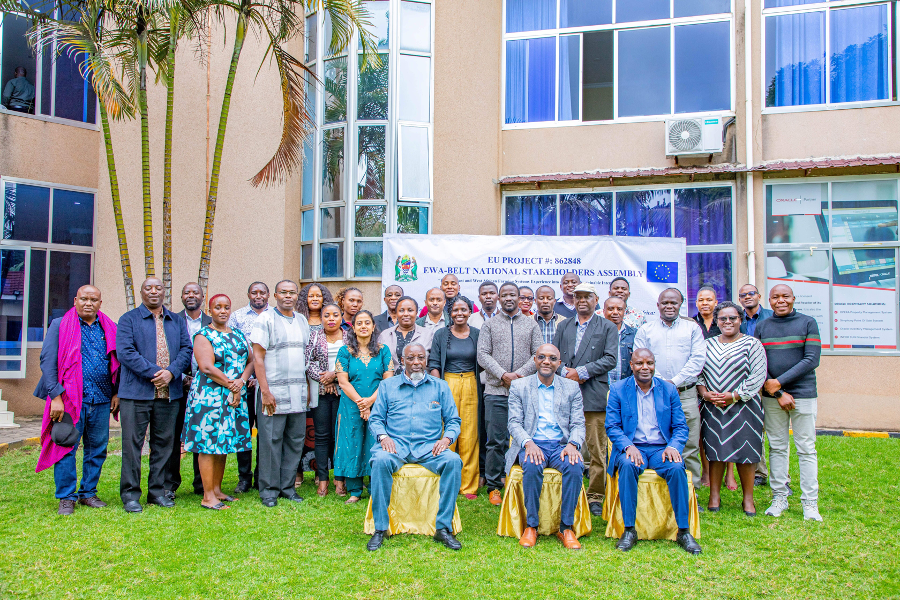EWA-BELT National Stakeholder Assembly in Ghana: Advancing Agricultural Innovation and Sustainability
- OCCAM - Observatory on Digital Communication

- Aug 18, 2025
- 3 min read
15-16 May, 2025 - Nyankpala, Tamale, Ghana

The National Stakeholder Assembly for the EWA-BELT Project was held from 15th to 16th May 2025 at the CSIR-Savanna Agricultural Research Institute (CSIR-SARI) in Nyankpala, Tamale, Ghana. The event brought together researchers, farmers, development partners, and government representatives to review achievements, share experiences, and outline future goals for sustainable agricultural development under the EWA-BELT Project, funded by the European Union’s Horizon 2020 programme.
The opening session was led by Dr. Mathias Fosu, who recalled his presence at the project’s launch and expressed satisfaction with its progress. Dr. Fosu emphasized the importance of sustainability in tackling food insecurity in countries like Ghana and raised questions on how sustainability would be measured and how farmers would be incentivized. Dr. Joseph Adjebeng-Danquah, on behalf of the Director of CSIR-SARI, welcomed participants and officially opened the assembly, encouraging active contributions throughout the event.
Professor Giovanna Seddaiu, the EWA-BELT Project Coordinator, presented a virtual overview of the EWA-BELT Project's objectives and progress. With over 30 Farmer Field Research Units established across six African countries, EWA-BELT has focused on integrating traditional knowledge with modern agricultural innovations. The main fields of action are Neglected and Underutilized Crop Species (NUS) such as fonio and frafra potato, biopesticides like neem seed and Securidaca root extracts, and the agri-livestock integration system that promotes sustainable land use. Furthermore, Professor Seddaiu explained how the EWA-BELT Project applied a holistic indicator-based framework for assessing sustainable intensification across five domains: production, environment, economy, social, and human development, allowing for a comprehensive evaluation of agricultural practices and their long-term impacts.
Dr. James Kombiok, from KDC, firstly highlighted successful trials with fonio, demonstrating its potential when intercropped with legumes such as cowpea and groundnut, and emphasizing the future need to find effective solutions and continue knowledge-sharing efforts. Secondly, Dr. Kombiok illustrated field trials with different landraces and cropping systems, with results indicating maize as the most productive crop while fonio performed best when intercropped under specific models.
Further presentations from CSIR-SARI researchers highlighted impactful research outcomes. Dr. Richard Yaw Agyare illustrated the collection and testing of fonio germplasm in five districts. Despite challenges in accessing female-sourced seeds, training sessions on fonio processing and transplanting were also conducted in selected communities. Dr. Prince Maxwell Etwire discussed baseline surveys on farmer perceptions of pests, aflatoxins, and climate change: indeed, over 70% of farmers could identify pests but noted that control was often cost-prohibitive. Dr. Adjebeng-Danquah explained how cassava intercropped with cowpea showed good results when cowpea was introduced a month after planting cassava. Furthermore, he analysed successful biopesticide trials for controlling fall armyworm in maize. Dr. Ramson Adombilla presented key findings on the use of tie-ridging and integrated organic-mineral fertilizer strategies, which led to significant yield improvements in millet and sorghum. Finally, Dr. Issah Sugri illustrated the effectiveness of combining improved varieties and Aflasafe with soil amendments to reduce aflatoxin contamination in groundnut.
One of the key highlights of the National Stakeholder Assembly was the sharing of experiences by farmers and district directors. A farmer from the Savelugu district described how fonio and intercropping techniques had improved his family’s nutrition and crop yield. A farmer from Nabdam district underlined how the use of neem seed oil reduced the need for chemical pesticides. In the Talensi district, a farmer expressed gratitude for the improved groundnut varieties, which supported him with his child’s university education. In the West Mamprusi district, another farmer recalled how they once dismissed fonio as grass but now cultivate it for income. Municipal and district agricultural directors showed how the EWA-BELT Project’s trials enriched both their knowledge and the capabilities of their field officers, with several also calling for increased seed availability, particularly for high-performing varieties such as SARINUT 2 and frafra potato.
Closing the assembly, Dr. Fosu commended CSIR-SARI and all stakeholders for their commitment and collaboration, acknowledging that the project had delivered on its goals and urged researchers to communicate in clearer, less technical language to better engage farming communities. He also called on institutions to ensure that successful seed varieties are made more accessible to farmers across the country.
The National Stakeholder Assembly affirmed the positive impact of the EWA-BELT Project in Ghana and reinforced the importance of combining scientific research, traditional knowledge, and inclusive engagement to build resilient and sustainable farming systems. The outcomes of this assembly provide a strong foundation for scaling up innovations that empower farmers and strengthen food security nationwide.
**
Follow us on social media to stay up to date!
EWA-BELT Project |
Website: www.ewabelt.eu Facebook: ewabelt.project Instagram: ewabelt_project X: ewabelt_project LinkedIn: showcase/ewa-belt YouTube: occam3039 Joint YouTube channel: @sfs35 |
For media inquiries, please contact:
OCCAM - Observatory on Digital Communication





Comments